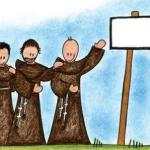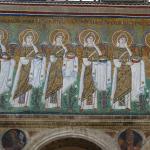On the morning of July 2nd, I scanned my wardrobe for something red or white or blue. My husband and I had agreed, the night before, we would take our girls to church without fail. Our daughters, nine and eleven, both want to attend church. For a year and a half now, we’ve been going to a little church plant that my childhood friend started. But we feel a new season upon us; we’re in the “market” for a new church home. The state of play in the order of Sunday operations: what-time-will-we-need-to-get-to-which-church, and to-which-of-its-services? creates a bit of drama powered by our own latent ambivalence. Maybe we will just sleep in, as everyone is tired is the competing logic here and it has been winning ⅓ of the time. On July 1st, we determined we would go to a local, large and influential Methodist church.
We did this, even though my partner and I have had our fair share of awkward July 4th celebrations. During our undergrad days at Southwestern Assemblies of God, in Waxahachie, Texas, we were proselytized into a peace witness by a young ethics professor who had read a lot of John Howard Yoder and Stanley Hauerwas. During the early aughts, (the years we were active in Pentecostals for Peace and Justice,) we refused to do nationalistic things in church–most especially for July 4th. We sat when others stood. We stood but didn’t sing, and so forth. We’ve never figured out how to negotiate July 4th church services. We just always feel awkward.
The week before this July 2nd service, I had an opportunity to ask the pastor of the Methodist church how he planned to handle the day. This pastor heartily assured me there would be a lunch to celebrate the holiday after the service, but that there would *not* be patriotic displays during the worship service. This assurance helped us decide to go.
Given the above, it is a bit difficult to explain why, on the morning of July 2nd, I felt like blending in. I suspected that, however winsome I found this young-ish pastor, it might be best for me to wear something befitting the day. I chose a blue and white dress and paired it with burgundy flats, which I felt would be close enough.
My instincts served me well on this day; I credit them to my being reared in Texas. Texas is the best explanation for what I saw when I entered the church: about 1000 Methodists, mostly 50+, mostly white, entirely clad in red, white and blue. A *sea* of red, white and blue. Everyone was entirely clad in patriotism.
The pastor was true to his word and preached an amazing sermon about King David and his mistakes. Any savvy listener could readily pick up that his message about repentance was one that extends to the nation. But the pastor’s word had its legislative limits. The choir performed rousing numbers and some of these songs had obvious patriotic ardor in them. It turned out that there was not only a lunch to celebrate the day. There would also be a full concert of patriotic songs, with special guest vocalists.
This experience got me thinking about the role of the laity in shaping worship. When I read about Christian Nationalism lately, I get the impression an author imagines that authoritarian preachers create nationalist sensibilities in their hearers. I get the impression that such preachers harbor a dark version of charisma, able to turn their listeners into q-anon sympathizers.
But my conversation with this Methodist pastor suggests another direction of influence to me. Might evangelical laity be calling the shots when it comes to how much or little one or another pastor cosigns a nationalistic agenda? More broadly, how much power do evangelical laity have in shaping the culture(s) of US evangelicalism?
Over the next five months, I plan to take these and closely related questions on the road to five different San Antonio megachurches. Megachurches are pretty influential in the culture of US evangelicalism, but their influences are often left out of landscape conversations about the state of religion in public life, which often begin with denominations and stay at that level. Megachurches, which are comprised of at least 2k attendees and bring in millions of dollars per year, are often non-denominational, so they are readily left off landscape analyses. Texas has more than its fair share of megachurches. San Antonio has seven in a 10 mile stretch of its city-encircling Loop 1604.
In the coming months, I plan to visit Max Lucado’s Oak Hills Church; John Hagee’s Cornerstone Church, Westover Hills Assemblies of God, Community Bible Church, and Gateway Fellowship. I’ve attended several of these churches during different periods of my (now seemingly quite long!) life– but this time, I will go in with the eyes of a participant observer. I’ll be looking for a. the degree of race and gender diversity in their pews and on their stages, b. for the salience of charismatic influence in their worship styles and rhetoric, and c. for the way leaders may be playing any role in stoking authoritarianism and white supremacy. (I will be printing a copy of Hartford’s 2020 Megachurch Study with me, for quick reference!)
I will report back on what I observe. I suspect that these visits will surprise some readers in showing more diversity than people think of when they think of Texas and evangelical church cultures. But I also anticipate being surprised. I’ve been away from San Antonio for about twenty years and will have the benefit of more critical distance when I get reacquainted with the area’s leading churches. Next month, I will report on my visit to Oak Hills. If you have any recommendations for me, for what I should look for– please reach out!













